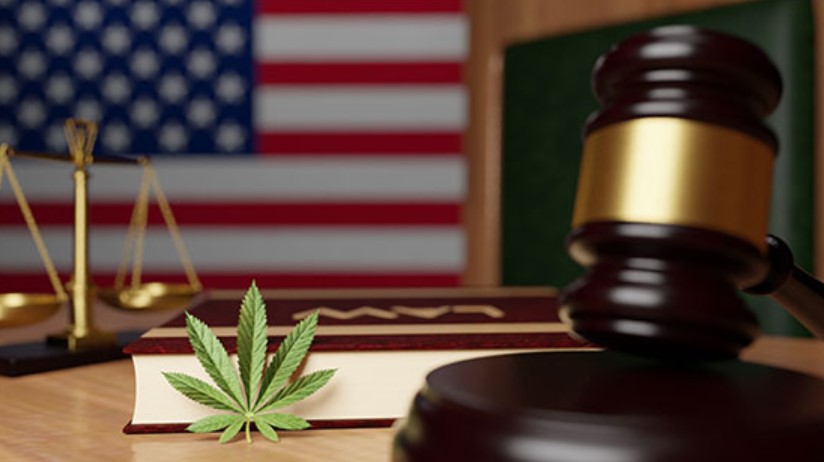Non classé
Cannabis Legalisation in USA
In a recent announcement, the President of the United States detailed his strategy to pardon those charged with simple cannabis possession by federal courts. But that’s not all; Biden also mentioned that he’s considering rescheduling cannabis, a move that could make access and research easier. However, it remains to be seen if he will go as far as legalizing cannabis entirely.
On October 6th, 2022, during a statement on marijuana reform, President Joe Biden said “Too many lives have been upended because of our failed approach to marijuana. It’s time that we right these wrongs”. Even though his approval rating is only 40%, Biden has created a plan that will most likely increase support among the two-thirds of Americans who agree with the legalization of cannabis.
But what changes will this reform bring? In his announcement, Biden also stated that “Sending people to prison for possessing marijuana has negatively impacted too many lives and incarcerated people for actions that many states no longer consider illegal”.
In other words, Biden is pushing for cannabis legalization on a grand scale – something that would let people grow as much herbe as they want without worrying about being arrested. What’s more, by saying that “criminal records for marijuana possession have also imposed needless barriers to employment, housing, and educational opportunities,” it seems like he wants to get rid of the social stigma around cannabis all to gether.
As we all know, the pre-election statements of politicians are often more empty than reliable. Still, curious about how new proposed reforms might alter the legal cannabis landscape of America? Read on to discover what areas will probably improve and which will remain unaltered according to recent data.
Does Biden’s Plan Mean Cannabis Is Federally Legal?
President Biden’s proposed marijuana reform will not legalize or decriminalize cannabis. The President made it clear that the plant remains illegal in his announcement, mentioning: “..important limitations on trafficking, marketing, and underage sales should stay in place”. This stance comes as no surprise, considering Biden was the only Democratic candidate in the 2020 election who refused to support the federal de-scheduling of cannabis.
Not only that, but as president, Biden can pardoning federal crimes alone—crimes violating national laws. People suspected of these acts are investigated by famous agencies such as the FBI or DEA then tried in front of a panel of federal judges where they more likely to be convicted. Biden has pardoned people only for “simple cannabis possession” out of all those charged with violating cannabis laws. He won’t pardon anyone facing prosecution for growing or supplying it at this time. So, now that that’s clear, let’s explore what Biden intends to do soon.

Step One: Pardon Some Federal Offences
President Biden plans to begin by reforming cannabis laws within his own jurisdiction. By pardoning those with simple cannabis possession charges, he will help around 6,500 people. Although no one is currently serving time in federal prison on these grounds, this reform will remove employment barriers and return voting rights. However, a pardon only forgiveness of a crime; it doesn’t declare an individual innocent or erase their criminal record.
Step Two: Urge States to Pardon Some Offences
President Biden urges states to follow his example, though it is ultimately up to state officials whether they wish to do the same. In America, federal law establishes the rights of all citizens while state laws build upon those rights. Many states have already legalized both medical and recreational cannabis use; politicians in these areas have done much better than President Biden on this issue. For example, Governor Pritzker of Illinois expunged nearly 500,000 cannabis arrest records in 2020 alone. Although cannabis possession is still illegal in some states, Biden’s example may persuade state legislators to pass similar laws for the good of their citizens. If all states made this change, it would affect millions of people, as opposed to only several thousand at the federal level.
Step Three: Federally Reschedule Marijuana
The most exciting part of Biden’s statement is the federal rescheduling of marijuana. The President said: “…I am asking the Secretary of Health and Human Services and the Attorney General to initiate the administrative process to review expeditiously how marijuana is scheduled under federal law”. Right now, cannabis is classified as a Schedule I substance by DEA, which means it has high potential for abuse and no accepted medical use – even though that’s not true. Substances that are classified in this category have no medical use that is currently accepted and a high potential for abuse. This definition creates conflict with state laws that permit cannabis to be prescribed by doctors for various health conditions.
The proposed decriminalization of cannabis would have a seismic impact on the level restrictions placed upon the herb. A reclassification to Schedule II would place it in line with drugs that have some accepted medical value, such as painkillers. If, however, the administration opts to place cannabis into Schedule V, it would join cough syrups and other comparatively innocuous substances in enjoying minimal regulation.
Moving cannabis to a lower Schedule would also have numerous benefits for the research community. Studies are ongoing to explore the potential of using cannabis to treat various diseases, from cancer and epilepsy all the way to neurodegenerative conditions. If we reschedule it, researchers will be ableto easily access the plant and study its metabolites in depth.
Where Does Biden’s Plan Fall Short?
Although it is excellent news that cannabis laws may become more lenient, we must not get our hopes up too high. President Biden recently announced that he would pardon several thousand people for a minor offence, but this falls far short of the long-awaited federal legalization of cannabis. There is a chance that his authority could fall outside state law in some instances, meaning his words might not amount to much change beyond his own jurisdiction. The possible rescheduling of cannabis use nationwide could create significant upheaval, but we’ll have to wait and see how the Biden administration approaches the issue.
How Did the Previous Presidency Affect Federal Cannabis Legalization?
How does Biden’s reform compare to Trump’s policies? When Donald Trump ran for president in 2016, he said that states should be able to decide whether or not to legalize cannabis. But his administration soon started upholding prohibitive federal laws and even trying to remove protections for state medical cannabis laws. Despite this, President Trump legalized hemp under the 2018 Farm Bill. Before this point, the law made no distinction between hemp and marijuana containing THC—the main psychoactive component in marijuana.


